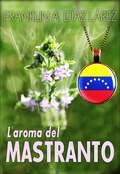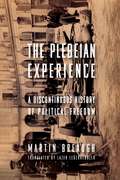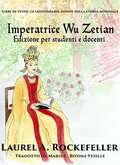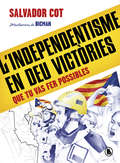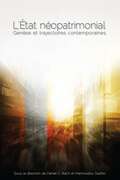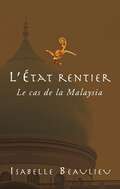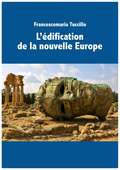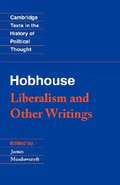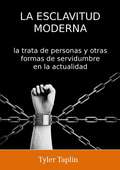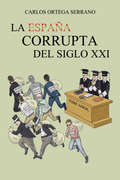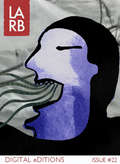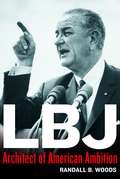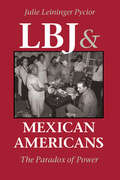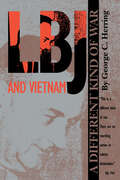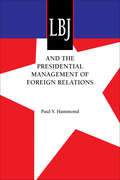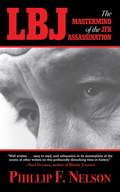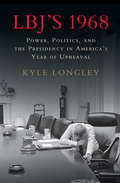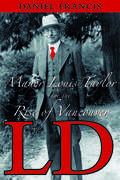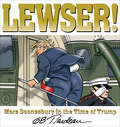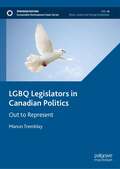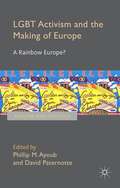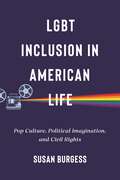- Table View
- List View
L'aroma del Mastranto
by Franklin A. Díaz LárezNarra la storia di una bambina che, durante l'anno 2012, a tredici anni di età, realizza un viaggio insieme a suo padre per conoscere il suo paese natale, ovvero il Venezuela, che aveva dovuto lasciare quando era molto piccola perché la sua famiglia era dovuta emigrare in Spagna, e in cui non aveva mai avuto l'occasione di tornare. In questo viaggio scoprirà una società profondamente divisa dalla radicalità, dall'odio e dal fanatismo politico. Conoscerà le disuguaglianze sociali, la differenza abissale tra ricchi e poveri, le cause e le conseguenze della delinquenza, l'insicurezza, la scarsità di alimenti, e l'idolatria e l'esaltazione delle figure di Simón Bolívar, Fidel Castro e Hugo Chávez. Venendo a contatto con la gente, scoprirà le cause e le conseguenze della storia venezuelana recente, i fatti sociali e politici più importanti, e le ragioni profonde delle diverse fazioni, traendo da tutto ciò le sue proprie conclusioni. Allo stesso tempo, cercherà di trovare, con il suo modo di pensare da bambina, una via d'uscita al caos, all'odio e all'intolleranza ideologica. Verrà anche a conoscenza, direttamente sul luogo dei fatti, della tragedia conosciuta col nome di "Massacro di Cantaura", e delle conseguenze che questa ha avuto sul destino della sua stessa famiglia. La storia è raccontata in prima persona dalla bambina stessa, attraverso una serie di lettere scritte a una sua amica di scuola.
L'experience plebeienne
by Martin BreaughHow do people excluded from political life achieve political agency? Through a series of historical events that have been mostly overlooked by political theorists, Martin Breaugh identifies fleeting yet decisive instances of emancipation in which people took it upon themselves to become political subjects. Emerging during the Roman plebs's first secession in 494 BCE, the plebeian experience consists of an underground or unexplored configuration of political strategies to obtain political freedom. The people reject domination through political praxis and concerted action, therefore establishing an alternative form of power. Breaugh's study concludes in the nineteenth century and integrates ideas from sociology, philosophy, history, and political science. Organized around diverse case studies, his work undertakes exercises in political theory to show how concepts provide a different understanding of the meaning of historical events and our political present. The Plebeian Experience describes a recurring phenomenon that clarifies struggles for emancipation throughout history, expanding research into the political agency of the many and shedding light on the richness of radical democratic struggles from ancient Rome to Occupy Wall Street and beyond.
L'imperatrice Wu Zetian: Versione per studenti e docenti (Libri di testo: Le leggendarie donne della storia mondiale #5)
by Laurel A. RockefellerLa donna piu' odiata della storia cinese! Nata nel 624 d. C., nella contea del Wenshui, provincia di Shanxi, nessuno si aspettava un futuro brillante per la bella Wu Zhao (il cui titolo regale era Wu Zetian) -- a parte causare danno allo sventurato che l'avrebbe sposata. L'esatto contrario di quanto ci si aspetta da una donna negli insegnamenti del confucianesimo, Wu Zhao non era solamente brillante, ma anche ben istruita e sproporzionatamente ambiziosa. Giudicata duramente, sia dai contemporanei che dai posteri in Cina, l'imperatrice Wu, di sicuro, mette tutti d'accordo sul fatto che il mondo, oggi, sia un posto migliore grazie alla sua audacia nello sfidare le convenzioni dell'epoca, osando fare cio' che nessun'altra donna dell'epoca avrebbe mai nemmeno sognato. Questo libro racconta la vera storia di una tra le donne piu' leggendarie al mondo. L'edizione per studenti e docenti comprende domande alla fine di ogni capitolo, volte a stimolare la riflessione critica su svariati temi, inoltre, alla fine della storia, viene fornita un'esaustiva cronologia ed una dettagliata lista di letture consigliate.
L'independentisme en deu victòries (que tu vas fer possibles)
by Salvador CotUn recorregut, de la mà del Salvador Cot, per deu fites històriques on el poble unit marca un camí, un nou camí que tu també has fet possible. El 13 de setembre de 2009, unes dues mil cinc-centes persones passaven per una única urna a Arenys de Munt. Pocs dies més tard, el torero José Tomás triomfava a la Monumental de Barcelona. Era l'època del boicot al cava, a Espanya, amb un domini aclaparador dels vins de la Rioja al mercat interior català... Una Catalunya diferent a la d'ara amb, només, 21 diputats independentistes al Parlament que donaven suport a José Montilla. Ha passat una dècada llarga i Catalunya no és una república, això és cert. Però és molt més independent que a l'inici d'aquesta aventura política, econòmica i social. No hem guanyat, però tampoc no hem perdut. I en el caseller hi tenim victòries importants i permanents.
L'État néopatrimonial: Genèse et trajectoires contemporaines (Études en développement international et mondialisation)
by Daniel C. Bach et Mamoudou GaziboUne étude approfondie du néopatrimonialisme en Afrique et ailleurs. Pourquoi le néopatrimonialisme est-il si fréquemment utilisé pour caractériser les systèmes politiques Africains ? Les pratiques auxquelles renvoie cette notion, qu’il s’agisse du clientélisme, de la corruption ou de la privatisation de l’État, sont pourtant présentes dans la plupart des pays, qu’ils soient ou non Africains. Afin de répondre à ce paradoxe, L’État néopatrimonial propose une exploration théorique et comparative de la diversité des trajectoires et usages contemporains du concept. À partir d’une discussion des références initiales de Max Weber au patrimonialisme, les différentes contributions abordent le néopatrimonialisme dans ses rapports avec l’analyse de la démocratisation, des relations internationales, de la sociologie des conflits et de l’économie du développement. L’ouvrage renouvelle les débats sur le néopatrimonialisme en Afrique, tout en les élargissant également à l’Asie, l’Europe et l’Amérique latine à travers des études de cas. Publié en français
L'État rentier: Le cas de la Malaysia (Études en développement international et mondialisation)
by Isabelle BeaulieuLa stabilité de la Malaysia -- gouvernée depuis 1957 par le même parti politique -- n’est pas assurée, ni par les mécanismes de la démocratie libérale, ni par des traits culturels, mais par l’État rentier et ses institutions. Les États rentiers puisent la majeure partie de leurs revenus à l’étranger, sous forme de rentes —ces États sont redistributeurs et non pas extracteurs de ressources. Parce que leurs revenus ne proviennent pas de la taxation de la population, ils sont réputés autonomes et peu dépendants de la société dont ils sont issus. Cette étude compare les différentes périodes de l’histoire de la Malaysia, utilisant les indicateurs conventionnels pour classifier des États rentiers : les activités d’exportation, la structure de la taxation, les investissements publics et les choix gouvernementaux en matière de développement socio-économique, ainsi que le cadre législatif autoritaire. L’ouvrage analyse la stabilité politique du régime non-démocratique de la Malaysia. Cette analyse, qui puise à l’histoire du développement politique et économique, met en lumière la dynamique spécifique d’un État rentier. Publié en français
L'édification de la nouvelle Europe
by Francescomaria TuccilloL’avenir de l’Europe et son rôle stratégique dans le monde créé sur la base de son histoire et des ses racines culturelles.
L. T. Hobhouse: Liberalism and Other Writings
by James Meadowcroft L. T. HobhouseL. T. Hobhouse was the most sophisticated intellectual exponent of liberal social reform in the early years of the twentieth century. This edition of his classic Liberalism, which includes a number of his other contemporaneous writings, will be of interest to a broad range of students and scholars in politics and the history of political thought.
LA ESCLAVITUD MODERNA: la trata de personas y otras formas de servidumbre en la actualidad
by Tyler Taplin Almendra S. LarrieuUna mirada muy interesante a las formas de esclavitud que existen en nuestros días. Se suele pensar que la esclavitud quedó en el pasado, pero este libro demuestra de manera contundente que eso no es cierto. Conocerá las diversas formas de esclavitud que existen en nuestra sociedad y las causas por las que una persona puede llegar a ser víctima de esa práctica. La esclavitud moderna está justo delante de usted, pero no puede verla. Descubrirá el funcionamiento de la trata de personas y las razones por las cuales no se detecta. Este libro le enseñará qué son la esclavitud moderna, la trata de personas y la explotación sexual.
LA ESPAÑA CORRUPTA DEL SIGLO XXI
by Carlos Ortega SerranoLa España corrupta del siglo XXI es un libro que emerge de la oscuridad con casos de corrupción política ocultos hasta ahora. La España corrupta del siglo XXI es un libro en el cual el autor plasma con total transparencia y llamando a las cosas por su nombre, muchas de las informaciones mediáticas, como también de las experiencias vividas del escritor sobre la corrupción que asola y atraviesa la nueva España democrática, la cual necesita con urgencia una regeneración total de esta enfermedad cancerígena que han implantado individuos tóxicos y corruptos, los cuales quieren seguir propagando la misma por los cuatro puntos cardinales de la geografía española. No es de extrañar la crisis en la que está sumergida esta nación, la cual está siendo saqueada sin escrúpulo alguno por muchos de sus políticos, banqueros y otros.
LARB Digital Edition
by Jonathan HahnDoes an academic boycott of Israel advance, or damage, the cause for peace in the Middle East?We brought together eight leading scholars to debate the question in an unprecedented forum, "Academic Activism: Israelis, Palestinians, and the Ethics of Boycott." Collectively, their essays - equal parts incisive, provocative, and passionate - deliver a multifaceted lens through which to view the Israeli/Palestinian conflict, the BDS (Boycott, Divest, Sanctions) movement, and the ongoing search for a path towards peace.
LBJ
by Randall WoodsFor almost forty years, the verdict on Lyndon Johnson's presidency has been reduced to a handful of harsh words: tragedy, betrayal, lost opportunity. Initially, historians focused on the Vietnam War and how that conflict derailed liberalism, tarnished the nation's reputation, wasted lives, and eventually even led to Watergate. More recently, Johnson has been excoriated in more personal terms: as a player of political hardball, as the product of machine-style corruption, as an opportunist, as a cruel husband and boss. In LBJ, Randall B. Woods, a distinguished historian of twentieth-century America and a son of Texas, offers a wholesale reappraisal and sweeping, authoritative account of the LBJ who has been lost under this baleful gaze. Woods understands the political landscape of the American South and the differences between personal failings and political principles. Thanks to the release of thousands of hours of LBJ's White House tapes, along with the declassification of tens of thousands of documents and interviews with key aides, Woods's LBJ brings crucial new evidence to bear on many key aspects of the man and the politician. As private conversations reveal, Johnson intentionally exaggerated his stereotype in many interviews, for reasons of both tactics and contempt. It is time to set the record straight. Woods's Johnson is a flawed but deeply sympathetic character. He was born into a family with a liberal Texas tradition of public service and a strong belief in the public good. He worked tirelessly, but not just for the sake of ambition. His approach to reform at home, and to fighting fascism and communism abroad, was motivated by the same ideals and based on a liberal Christian tradition that is often forgotten today. Vietnam turned into a tragedy, but it was part and parcel of Johnson's commitment to civil rights and antipoverty reforms. LBJ offers a fascinating new history of the political upheavals of the 1960s and a new way to understand the last great burst of liberalism in America. Johnson was a magnetic character, and his life was filled with fascinating stories and scenes. Through insights gained from interviews with his longtime secretary, his Secret Service detail, and his closest aides and confidants, Woods brings Johnson before us in vivid and unforgettable color.
LBJ & Mexican Americans: The Paradox of Power
by Julie Leininger PyciorAs he worked to build his Great Society, Lyndon Johnson often harkened back to his teaching days in the segregated "Mexican" school at Cotulla, Texas. <P><P>Recalling the poverty and prejudice that blighted his students' lives, Johnson declared, "It never occurred to me in my fondest dreams that I might have the chance to help the sons and daughters of those students and to help people like them all over this country. But now I do have that chance--and I'll let you in on a secret--I mean to use it." <P> This book explores the complex and sometimes contradictory relations between LBJ and Mexican Americans. Julie Pycior shows that Johnson's genuine desire to help Mexican Americans--and reap the political dividends--did not prevent him from allying himself with individuals and groups intent on thwarting Mexican Americans' organizing efforts. Not surprisingly, these actions elicited a wide range of response, from grateful loyalty to, in some cases, outright opposition. Mexican Americans' complicated relationship with LBJ influenced both their political development and his career with consequences that reverberated in society at large.
LBJ and Mexican Americans: The Paradox of Power
by Julie Leininger PyciorAs he worked to build his Great Society, Lyndon Johnson often harkened back to his teaching days in the segregated "Mexican" school at Cotulla, Texas. Recalling the poverty and prejudice that blighted his students’ lives, Johnson declared, "It never occurred to me in my fondest dreams that I might have the chance to help the sons and daughters of those students and to help people like them all over this country. But now I do have that chance—and I’ll let you in on a secret—I mean to use it." This book explores the complex and sometimes contradictory relations between LBJ and Mexican Americans. Julie Pycior shows that Johnson’s genuine desire to help Mexican Americans—and reap the political dividends—did not prevent him from allying himself with individuals and groups intent on thwarting Mexican Americans’ organizing efforts. Not surprisingly, these actions elicited a wide range of response, from grateful loyalty to, in some cases, outright opposition. Mexican Americans’ complicated relationship with LBJ influenced both their political development and his career with consequences that reverberated in society at large.
LBJ and Vietnam: A Different Kind of War (An Administrative History of the Johnson Presidency)
by George C. HerringDecades later, the Vietnam War remains a divisive memory for American society. Partisans on all sides still debate why the war was fought, how it could have been better fought, and whether it could have been won at all. <P><P> In this major study, a noted expert on the war brings a needed objectivity to these debates by examining dispassionately how and why President Lyndon Johnson and his administration conducted the war as they did. Drawing on a wealth of newly released documents from the LBJ Library, including the Tom Johnson notes from the influential Tuesday Lunch Group, George Herring discusses the concept of limited war and how it affected President Johnson's decision making, Johnson's relations with his military commanders, the administration's pacification program of 1965-1967, the management of public opinion, and the "fighting while negotiating" strategy pursued after the Tet Offensive in 1968.
LBJ and Vietnam: A Different Kind of War (An Administrative History of the Johnson Presidency)
by George C. Herring&“[A] compelling analysis . . . A solid addition to our understanding of the Vietnam War and a president.&” —Publishers Weekly The Vietnam War remains a divisive memory for Americans—partisans on all sides still debate why it was fought, how it could have been better fought, and whether it could have been won at all. In this major study, a noted expert on the war brings a needed objectivity to these debates by examining dispassionately how and why President Lyndon Johnson and his administration conducted the war as they did. Drawing on a wealth of newly released documents from the LBJ Library, including the Tom Johnson notes from the influential Tuesday Lunch Group, George Herring discusses the concept of limited war and how it affected President Johnson&’s decision making, Johnson&’s relations with his military commanders, the administration&’s pacification program of 1965–1967, the management of public opinion, and the &“fighting while negotiating&” strategy pursued after the Tet Offensive in 1968. This in-depth analysis, from a prize-winning historian and National Book Critics Circle Award finalist, exposes numerous flaws in Johnson&’s approach, in a &“concise, well-researched account&” that &“critiques Johnson's management of the Vietnam War in terms of military strategy, diplomacy, and domestic public opinion&” (Library Journal).
LBJ and the Presidential Management of Foreign Relations (An Administrative History of the Johnson Presidency)
by Paul Y. HammondIn this insightful study, Paul Y. Hammond, an experienced analyst of bureaucratic politics, adapts and extends that approach to explain and evaluate the Johnson administration’s performance in foreign relations in terms that have implications for the post–Cold War era. The book is structured around three case studies of Johnson’s foreign policy decision making. The first study examines economic and political development. It explores the way Johnson handled the provision of economic and food assistance to India during a crisis in India’s food policies. This analysis provides lessons not only for dealing with African famine in later years but also for assisting Eastern Europe and the former Soviet Union. The second case study focuses on U.S. relations with Western Europe at a time that seemed to require a major change in the NATO alliance. Here, Hammond illuminates the process of policy innovation, particularly the costs of changing well-established policies that embody an elaborate network of established interests. The third case study treats the Vietnam War, with special emphasis on how Johnson decided what to do about Vietnam. Hammond critiques the rich scholarship available on Johnson’s advisory process, based on his own reading of the original sources. These case studies are set in a larger context of applied theory that deals more generally with presidential management of foreign relations, examining a president’s potential for influence on the one hand and the constraints on his or her capacity to control and persuade on the other. It will be important reading for all scholars and policymakers interested in the limits and possibilities of presidential power in the post–Cold War era.
LBJ and the Presidential Management of Foreign Relations (An Administrative History of the Johnson Presidency)
by Paul Y. HammondIn this insightful study, Paul Y. Hammond, an experienced analyst of bureaucratic politics, adapts and extends that approach to explain and evaluate the Johnson administration’s performance in foreign relations in terms that have implications for the post–Cold War era. The book is structured around three case studies of Johnson’s foreign policy decision making. The first study examines economic and political development. It explores the way Johnson handled the provision of economic and food assistance to India during a crisis in India’s food policies. This analysis provides lessons not only for dealing with African famine in later years but also for assisting Eastern Europe and the former Soviet Union. The second case study focuses on U.S. relations with Western Europe at a time that seemed to require a major change in the NATO alliance. Here, Hammond illuminates the process of policy innovation, particularly the costs of changing well-established policies that embody an elaborate network of established interests. The third case study treats the Vietnam War, with special emphasis on how Johnson decided what to do about Vietnam. Hammond critiques the rich scholarship available on Johnson’s advisory process, based on his own reading of the original sources. These case studies are set in a larger context of applied theory that deals more generally with presidential management of foreign relations, examining a president’s potential for influence on the one hand and the constraints on his or her capacity to control and persuade on the other. It will be important reading for all scholars and policymakers interested in the limits and possibilities of presidential power in the post–Cold War era.
LBJ: The Mastermind of the JFK Assassination
by Phillip F. NelsonLBJ aims to prove that Vice President Johnson played an active role in the assassination of President Kennedy and that he began planning his takeover of the U.S. presidency even before being named the vice presidential nominee in 1960. Lyndon B. Johnson's flawed personality and character traits, formed as a child, grew unchecked for the rest of his life as he suffered severe bouts of manic-depressive illness. He successfully hid this disorder from the public as he bartered, stole, and finessed his way through the corridors of power on Capitol Hill, though it's recorded that some of his aides knew of his struggle with bipolar disorder. After years of researching Johnson and the JFK assassination, Phillip F. Nelson conclusively shows that LBJ had an active role in JFK's assassination, and he includes newly-uncovered photographic evidence proving that Johnson knew when and where Kennedy's assassination would take place. Nelson's careful and meticulous research has led him to uncover secrets from one of the greatest unsolved mysteries in our country's history.
LBJ’s 1968: Power, Politics, and the Presidency in America's Year of Upheaval
by Kyle Longley1968 was an unprecedented year in terms of upheaval on numerous scales: political, military, economic, social, cultural. In the United States, perhaps no one was more undone by the events of 1968 than President Lyndon Baines Johnson. <P><P>Kyle Longley leads his readers on a behind-the-scenes tour of what Johnson characterized as the 'year of a continuous nightmare'. Longley explores how LBJ perceived the most significant events of 1968, including the Vietnam War, the assassinations of Martin Luther King, Jr and Robert Kennedy, and the violent Democratic National Convention in Chicago. His responses to the crises were sometimes effective but often tragic, and LBJ's refusal to seek re-election underscores his recognition of the challenges facing the country in 1968. As much a biography of a single year as it is of LBJ, LBJ's 1968 vividly captures the tumult that dominated the headlines on a local and global level. Analyzes the crisis management style of a President; Features modern continuities in policymaking and political discourse, providing readers with a better understanding of the ongoing debates in today's political sphere; Highlights the challenges facing a president after five years of almost non-stop change and a rising conservative backlash.
LD
by Daniel FrancisLD is the colourful biography of Louis Taylor, the longest-serving mayor in Vancouver's history; he was first elected mayor in 1910, and served off and on until 1934, for a total of eleven years. Taylor's story is also the story of Vancouver in the early decades of the 20th century, a young city experiencing a turbulent adolescence.Louis Taylor, or LD as he was known, arrived in Vancouver from Chicago in 1896 at the age of 39. He got involved in the newspaper business, first as an executive with The Daily Province, then as proprietor of The World, during which time he built the World Tower, which remains one of Vancouver's landmark buildings (now better known as the Sun Tower).He launched his political career in 1902 when he ran successfully for licence commissioner; it was the first of 26 civic elections in which he ran, including 20 for mayor. In his early political life he was considered "the workers' friend" and was opposed by the city's business elite, who portrayed him as corrupt. He also had a reputation for being soft on crime, and was implicated in a 1928 police investigation that lost him an election. But his achievements included the establishment of the airport, a town planning commission, and the water board.His private life, however, was another story, a virtual soap opera that mirrored the ups and downs of his political career; his wife was addicted to opium, and he found himself mired in bigamy and divorce scandals.As Vancouver grew from small frontier town to a major international port city, LD saw the city through the Depression, and in a sense Vancouver grew up under his tutelage.LD: Mayor Louis Taylor and The Rise of Vancouver vividly documents the life of a man who dominated the city for years.
LEWSER!: More Doonesbury in the Time of Trump (Doonesbury Ser.)
by G. B. TrudeauFollowing YUGE! and #SAD!, volume three of the Doonesbury Trump Trilogy chronicles the disrupter-in-chief’s massive output of grievance and fear.From the Pulitzer Prize–winning cartoonist whose acclaimed YUGE!: 30 Years of Doonesbury on Trump blew up the bestseller list, G. B. Trudeau’s final installment of his Doonesbury Trump Trilogy takes readers through the dark heart of Trump’s presidency and into 2020 election mania. Including two years’ worth of original Doonesbury Sundays, full-color spreads, and eighteen previously unpublished strips, the presciently-titled LEWSER! chronicles our most recent—and apparently never-ending—national nightmare.“When historians look back on this era, Doonesbury will be as good a record as any of the national zeitgeist.” —Rolling Stone“Why so surprised America? Doonesbury has been preparing us for President Trump since 1987.” —USA Today
LGBQ Legislators in Canadian Politics: Out to Represent (Sustainable Development Goals Series)
by Manon TremblayThis book considers the impact that the increasing number of LGBQ politicians in Canada has had on the political representation of LGBTQ people and communities. Based on analysis of parliamentary speeches and interviews with 28 out LGBQ parliamentarians in Canada between 2017 and 2020, Tremblay shows how out LGBQ MLAs and MPs take advantage of their intermediary position between the LGBTQ movement and the state to represent LGBTQ people and communities. For example, the politicians in this study introduce pro-LGBTQ bills, lobby cabinet ministers, act as a bridge between LGBTQ groups and the civil service, and give talks in schools about their identities. Most importantly, they act as role models for LGBTQ people (particularly children and teens) and contribute to lifting the social stigma around sexuality and gender identity. This latest volume in our Sustainable Development Goals series underlines that SDG 16 (Peace, Justice, and Strong Institutions) can only be accomplished with political representation for the LGBTQ community and minority groups in general.
LGBT Activism and the Making of Europe
by Phillip M. Ayoub David PaternotteThis book explores the alleged uniqueness of the European experience, and investigates its ties to a long history of LGBT and queer movements in the region. These movements, the book argues, were inspired by specific ideas about Europe, which they sought to realize on the ground through activism.
LGBT Inclusion in American Life: Pop Culture, Political Imagination, and Civil Rights (LGBTQ Politics #4)
by Susan BurgessA compelling explanation of the American public’s acceptance of LGBT freedoms through the lens of pop cultureHow did gay people go from being characterized as dangerous perverts to military heroes and respectable parents? How did the interests of the LGBT movement and the state converge to transform mainstream political and legal norms in these areas?Using civil rights narratives, pop culture, and critical theory, LGBT Inclusion in American Life tells the story of how exclusion was transformed into inclusion in US politics and society, as pop culture changed mainstream Americans thinking about “non-gay” issues, namely privacy, sex and gender norms, and family. Susan Burgess explores films such as Casablanca, various James Bond movies, and Julie and Julia, and television shows such as thirtysomething and The Americans, as well as the Broadway sensation Hamilton, as sources of growing popular support for LGBT rights. By drawing on popular culture as a rich source of public understanding, Burgess explains how the greater public came to accept and even support the three central pillars of LGBT freedoms in the post–World War II era: to have consensual adult sex without fear of criminal penalty, to serve openly in the military, and to marry legally. LGBT Inclusion in American Life argues that pop culture can help us to imagine unknown futures that lead beyond what we currently desire from contemporary politics, and in return asks now that the mainstream public has come to accept LGBT freedoms, where might the popular imagination be headed in the future?
